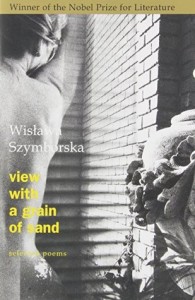I’ve had this edition of Szymborska’s Selected Poems for some time but hadn’t gotten around to reading it. Luckily, my poetry discussion group chose her to be the poet we read this month. Unlike a book club where people read the book ahead of time, we meet and read the poems together and discuss. Here, though, I took advantage of the opportunity to read this collection by this Polish poet who won the 1996 Nobel Prize in Literature.
I’m so glad I did! I love Szymborska’s understated wit skewering our preoccupations and assumptions. For example, in “Seen from Above”, she confronts a dead beetle in the road, unlamented because:
What’s important is valid supposedly for us.
For just our life, for just our death,
a death that enjoys an extorted primacy.
I love her ability to focus intently on the small things, the brief moments of life and celebrate them—something that poetry is especially appropriate for. Here is “Vermeer”, quoted in its entirety:
As long as the woman from Rijksmuseum
in painted silence and concentration
day after day pours milk
from the jug to the bowl,
the World does not deserve
the end of the world.
I love her humor. She writes of wildly inventive dreams or uses the images of clouds floating across the sky and ants trudging through a checkpoint to make fun of our human preoccupation with borders. She even creates neologisms worthy of e. e. cummings, as in “Allegro Ma Non Troppo” which begins:
Life, you’re beautiful (I say)
you just couldn’t get more fecund,
more befrogged or nightingaley,
more anthillful or sproutsprouting.
I love the way she is able to write about the horrors of war in ways that do not accuse but rather appeal to our common humanity, or sometimes to our place in the natural world. In “The End and the Beginning”, she drily points out what perhaps only a woman might notice:
After every war
someone has to clean up.
Things won’t
straighten themselves up, after all.
But she also notes that by cleaning everything up, we run the danger of the next generation forgetting what’s happened; sparing them the horror could lead them blithely into the next war.
Those who knew
what was going on here
must make way for
those who know little.
And less than little.
And finally as little as nothing.
In concentrating on themes and overall approaches, I haven’t mentioned her amazingly effective word choice, her use of repetition to add power, her sly allusions to a range of cultural artifacts from popular songs to the Bible. She often uses irony, something for which I have a bit of tin ear, so I’m grateful for others in the group pointing out possible ironic interpretations of some of the poems.
She also finds ways to celebrate life, as in “Miracle Fair”, where she applauds a variety of commonplace miracles, such as “cows will be cows” or “that the sun rose today and three fourteen a.m. / and will set tonight at one past eight”. As one member of the group exclaimed near the end of our discussion, I love this woman!
Have you read any of Szymborska’s poetry? Do you have a favorite among her poems?

